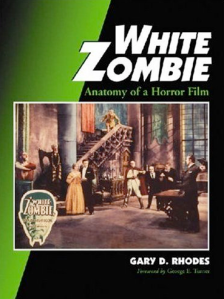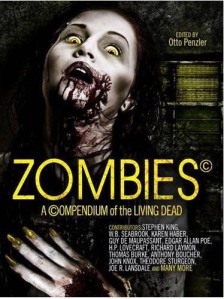Category Archives: Social
When I think about zombies…*
Posted by VintageZombie

* Of course it depends on what universe of zombies, but, in general, this dude totally nails it XD
Human cruelty
Posted by VintageZombie
One of the clearest themes in horror, and other genres besides, is pointing out human cruelty. The desire to stay alive in a zombie apocalypse leads some people to sacrifice others so they can live (usually rich and rude jerks we don’t care about living anyway). One of my favourite Twilight Zone episodes is The Shelter, where people do ask ‘Why should your family live while mine dies?’
In Zombies, Vampires and Philosophy, Leah Murray refers to Thomas Hobbes claim that life in a “state of nature”, without government or authority, is “solitary, poor, nasty, brutish and short” . Murray extends this to the zombie apocalypse, looking at Romero’s Dead series. In thinking about recent battlegrounds, you could go further and apply this to jerks on the inernet – with anonymity and seeming no authority or law, people are free to call you whatever negative terms they can think of (although I do think ‘baddie’ is a stupid term).
Hiding away food, weapons, information is fairly common – especially outside of horror. But there are other examples of human cruelty that is not against each other. Cruelty against weak/helpless zombies is common, usually red necks picking them off, blowing them up, stringing them up and using them as target practise. Admittedly, this could just be a reflection of what could be our cruelty to each other if we had anarchy.
There’s nothing in the world I love like a person who likes and is kind to animals, especially my cat. There are quite a few heroes in the zombpocalypse who still look after animals and share meager stores with them (non-zombiepocalypses too!). Human cruelty is seen in so many ways and with varying levels of severity. Some see horse jumping as cruelty. Dog fights are definitely cruel. I forget where it’s from, whether academic or fiction, but I remember a saying that our civilisations worth is based upon how we treat our smallest, our weakest.
Posted in Books, Films/TV, Social, Spec Fic Genres
Tags: horror, internet community, Romero, survivors, sympathy, Twilight Zone
Being historical
Posted by VintageZombie

One of the things I constantly have to remind myself of is the historical context. I’m reading White Zombie: Anatomy of a Horror Film by Gary D Rhodes. For me, White Zombie with Bela Lugosi is hugely racist, but in the book and comparing the role of African-Americans at the time, it was actually quite good with racial issues. I cringe for the heroine, Madeline, and all the men slobbering over her and wanting to dominate her, but this was an extremely different time for gender too.
Romero’s movies can be the same, although in a lot of cases, Romero did it deliberately. What a sook Barbra is! At least Fran learns a few things about survival, and Sarah is quite capable and intelligent, even in the face(s) of death. Later and later, with Re-Animator and the sequels, men seek to dominate women again, to say little of the nude women of the Italian zombie movies.
It’s most likely been the same throughout history, asking ‘What were they thinking?!’ of earlier generations. But that’s precisely what we have to ask. What were they thinking? What was the historical context? What was the panic of the time? What were the key events that influenced people? There’s always debate over the conscious and unconscious inclusions or exclusions – what is the extent of the influence of events on authors, such as WW1 and Tolkien (Tolkien and the Great War by John Garth is one I’m interested in 🙂 )?
I just bought a new book (always!), an anthology of zombie stories throughout the 20th century and including some of the most famous authors in the genre, Edgar Allen Poe, Lovecraft, Stephen King, Richard Matheson, and then some not so famous. The first is from W B Seabrook, the one considered to be the author that brings zombies into the US – and then the world’s – consciousness. Researching the context is not quite enough, but being aware of your own expectations, bias’ and assumptions when it comes to critiquing the historical.

Beyond fear
Posted by VintageZombie
Horror is way of confronting reality we are too freaked out by to see in realistic ways. A movie on 9/11 would be incredibly traumatising for viewers. A movie using zombies harassing humans is still scary but gives us the sense that the fear isn’t so close to home. This is talked about in many essays and books, about many genres of many types of media. Nothing new here! Same could be said for romance even!
Escapism is a cheap excuse for some people to explain away genres, such as fantasy. Who would want to escape into a ruined world under constant threat? Frankly, a perfect world would be boring. Why create or build or do anything when there is nothing to accomplish? It reminds me of 7 of 9’s speech in Voyager “May all her desires be fulfilled except for one, so she’ll always have something to strive for.”
Why The Star Trek Universe is Secretly Horrifying — powered by Cracked.com
Pain and fear gives us the nudge to strive beyond ourselves. It is exemplified in wartime particularly, when radical new technologies are created that change the way we exist. From radars in the blitz, to the microwave. Threats to our survival force us to innovate. It is more than inspiration, it’s a need.
Different genres move into the fore or adapt as what we need or fear changes. Sometimes we don’t need zombies, maybe? They represent a tangible fear, something we can fight and survive even though the odds are terrible. Communism, terrorism, it is feared these hide in our society and will infect our friends, our families. We don’t always have a face for war or evil or fear, sometimes we do. Usually war doesn’t stop when that one face is gone. Zombies are the perfect expression. We fear so much in our tiny lives, from the global to the individual. When our loved ones fight us, is it them, or just a soulless corpse? How could we ever tell if they can or can’t be brought back to what they used to be?
Just a few thoughts, anyway.